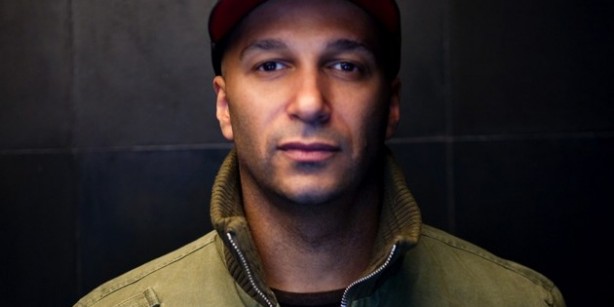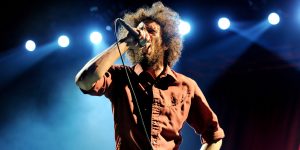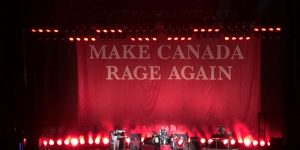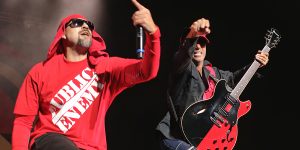 Music
Music
Q & A: Tom Morello talks about adopted persona, his father, and Springsteen
by Sam Sutherland
September 10, 2011
Tom Morello has done some shit. He defined a generation’s nascent activist tendencies with Rage Against the Machine, produced massive rock-radio hits with Audioslave, and teamed up with Boots Riley from the Coup to reclaim the downtrodden genre of rap-rock with the Street Sweeper Social Club. He’s also been busy as a solo artist since 2003, adopting the moniker of the Nightwatchman as an outlet for his proclivity for protest songs during the apolitical Audioslave era. The project has continued and developed, growing from strictly-acoustic singer-songwriter to a full band, replete with his signature electric guitar style, on the Nightwatchman’s latest full-length, World Wide Rebel Songs.
We sat down with Morello in his Toronto hotel room to talk about his evolution as a solo artist.
AUX: You’ve always talked about the Nightwatchman as a persona. It’s not just a name that isn’t your own, so people aren’t just yelling out Rage songs for you to play –
Tom Morello: Which was very important to begin with.
So what makes it different from just a name for a solo endeavour? What makes it a persona?
It’s changed over the course of the eight years I’ve been doing it. It was initially a tongue-in-cheek adopting of a character that was a mythic, self-mythologizing way to write songs. What I’ve realized, over the course of four records, is that I’m much less confident which is the real me. As I’ve stirred around in the silt of my psyche, it’s not entirely clear whether the truth of the matter is the often dark, and sometimes disturbing lyrics that come up in the Nightwatchman world, or the jovial character you see sitting across from you right now in a Toronto hotel room. It makes it a much more interesting artistic pursuit.
When you sit down to write material, are you always thinking about that character?
Never. With few exceptions. The more didactic numbers, like “World Wide Rebel Songs,” or “Union Town,” are the only ones that comes from a conscious place, where I sit down to write song. It’s more sitting in traffic, or in the middle of the night. I don’t know where it comes from. That place of inspiration feels like it’s very artistically honest. Even when I reflect on this record, and songs like “Fifth Horseman of the Apocalypse” or “God Help Us All,” where does that come from? It’s not me. I’m a nice guy, aren’t I? These are songs that are angry in a very Lone Gunman way.
Which is interesting to me.
That’s what I’ve discovered through this process. It reveals something that’s very true about oneself. I’m constantly surprised by what a dark character I am, when in my daily life, I’m not.
You seem like a nice man.
I am!
Have you ever come up with something you actually had to censor because it wasn’t something you were comfortable expressing?
No, because I feel like honesty is the best policy. Take a song like “Facing Mount Kenya.” It’s the first time that I’ve addressed in any way that part of my family. I grew up with this legacy in my home of these great African revolutionaries. But I didn’t know them. I didn’t know my dad. They were just pictures on the wall in this entirely Caucasian suburb. Here were these old photos that were half of who I am, but in some ways completely unrelated to my existence. In my DNA, but not in my life.
I’m also interested in the way the project has developed sonically. Is that something that just happened, or was it self-conscious?
It was self-conscious. It was a specific moment that made that seem like it was going to be okay, when I played “The Ghost of Tom Joad” with Bruce Springsteen a few years ago. It was the first time I had ever sung with an electric guitar in my hand. And I realized that I could bridge those worlds without losing any of the integrity of the singer-songwriter milieu. This is the 14th record of my career. It’s the fourth Nightwatchman record. I’ve now made as many Nightwatchman records as Rage Against the Machine records. If I’m not going to be comfortable with all elements of who I am as an artist now… Why tie one arm behind my back? I also produced this record at home in my own studio. I let the songs evolve into what they were going to be. Sometimes I would swap out a harmonica solo for a guitar solo.
Was there a swapping out of influences? Early Nightwatchman has an obvious Woody Guthrie, Billy Bragg kind of vibe, and this record has a very electric-Dylan, “fuck you” kind of energy.
Of course. One, in a co-songwriter in Ben Harper on “Save the Hammer for the Man.” It’s the first time on a Nightwatchman record that I’ve invited someone else into that very private world. It’s one of my favourite songs on the record. “Speak and Make Lightning” is very consciously modeled after some of the songs on Sandinista!, where it felt like they were saying ‘We can do any kind of music.’ So I wanted to do a punk-gospel song with a shredding outer-space solo. So be it.
Is there any danger when you’re working at your own studio to just lose yourself in a song?
There is, but not for me. I’m very impatient. And thanks to working with Brendan O’Brien, I understand the importance of capturing the moments. I’m not trying to make Dark Side of the Moon. The first Nightwatchman records took four or five days. This took a couple of months, which did give a little bit of breathing room to listen and go back and do another take.
Tags: Music, Interviews, News, Rage Against The Machine, Tom Morello





